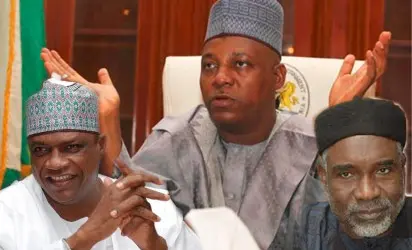IT has been the worst of times in Nigeria; this past month. The harvest of deaths has troubled Nigerians in ways that hack back to the frightening days of the civil war. There are very few places in Nigeria today that do not have the re-inforced presence of security forces.
There is a lot that is wrong in the land! From Baga through to Bama, and other places in-between, Nigerians are caught up in an orgy of death and destruction which questions the efficacy of the state, as is presently constituted. Something just had to give.
It seemed that the Nigerian state has just woken from a slumber as its hegemony collapses all around it, in practically every corner of the country. A troubling variety of anti-state actors have become emboldened by the manner that the state has operated.
Citizens don’t feel safe at home, work, leisure or at prayer. And the constitutional provision that emphasizes the central place of security of person and property, to the purpose of governance, has become very hollow in Nigeria. Citizens don’t have a strong state to run to for cover. Self-help has become so central to the survival of people in communities.It was against this background, that President Goodluck Jonathan took his decision to impose a state of emergency. The military will get a free reign while the institutions of governance in Borno, Yobe and Adamawa will continue to function.
This was the only victory for reason in a process which seemed to have alarmed Nigerians from all walks of life, when the rumour first emerged a couple of days ago. People seemed to have recognized that the central government has a challenge to get to the roots of the insurgency, but they would not brook the suspension of lawfully constituted governmental authorities in the states concerned.
That is fine in itself but fundamentally, what does the declaration mean? How are the troops to operate and what will be the rules of engagement that one will hold the Nigerian security forces to strictly adhere to? What are they going to do differently from what they did in the recent past, which has led to accusations that the military inadvertently became recruiting sergeants for the insurgency?
The challenge of enforcing the emergency is not going to be a tea party. The troops must be as compassionate as they possibly could be in the circumstance; unfortunately, that so far, is not the practice.
But more central is how the sphere of authority of the governments in the states of Borno, Yobe and Adamawa will be protected from erosion by rampaging troops that feel loyalty to their field commanders or the security hierarchy in Abuja.
But we will not tire to state that there are underlining socio-economic as well religious/ideological issues that must be creatively deconstructed if there is a desire to find the lasting peace which our society deserves. There are deep-seated manifestations of injustice in the land that revolt the heart of the patriot.
The ruling class continues to maintain its inordinate privileges to the detriment of the basic needs of the majority of the people of Nigeria. And today, 75 percent of the population is now under the age of 35.
It is an embittered generation, with few positive options to live a decent livelihood; they make up the gang of robbers and kidnappers; are the main components of the ideologically-driven members of Boko Haram and they are the cultists prowling the universities, raping their classmates and contemporaries; they are the yahoo-yahoo boys extracting money from people around the world to finance unearned but lavish lifestyles of the best cars and the most beautiful girls.
In all these anti-state activities, they mirror the brazen manner of ruling class irresponsibility at the heart of the dysfunctional state that our country has increasingly become.
The Borno governor, Kashim Shettima was very right when he warned last week, that Nigeria is peeping down the barrel of revolutionary upheaval. But it seems that we are much closer to an anarchic deluge; unfortunately, the ruling class only serves more of the same: their privileges above everything else.
A lot of these problems need to be resolved in the realm of political struggle. For most of the period since 1999, the form and content of politics have merely reinforced a piratical propensity of the ruling class in our country.
Those with access to the levers of power indulge in the most criminal prebendalism that has morphed into the state of crises which engulfs the nation today. In all that we are grappling with, the state itself has eroded in competence and ability while its legitimacy means very little to those who have openly challenged its monopoly of violence and are willing to duel to the death, to harm it to the point of dissembling.
The declaration of a state of emergency is a show of teeth and the beginning of the extra projection of the coercive arm of state power. But the issue is whether it can lead us to a favourable outcome. Just the day before the emergency was declared, Imam Abubakar Shekau released a new video.
He claimed responsibility for Baga and Bama; reiterated that Boko Haram now captures women and children in retaliation for their own detained by the state and he will not touch amnesty by a long pole. We are caught up in a logjam from hell and we will need more than Solomon’s wisdom to beak the tragic and violent impasse.


